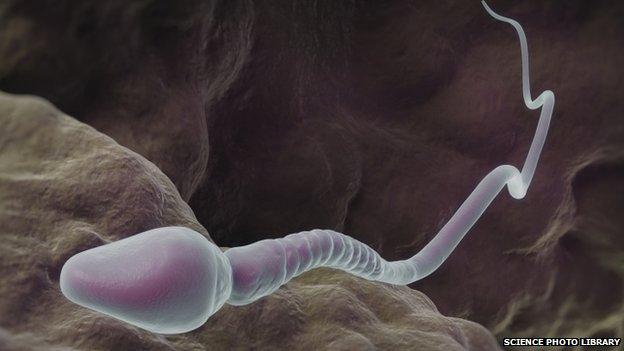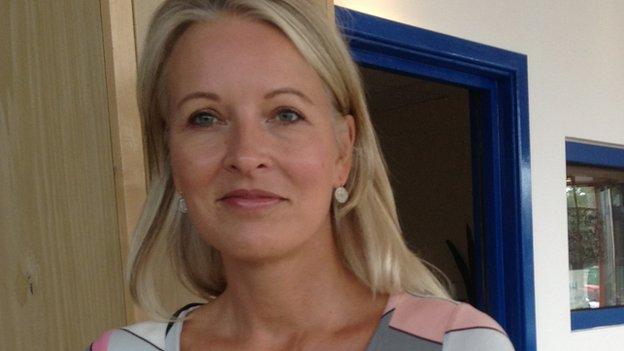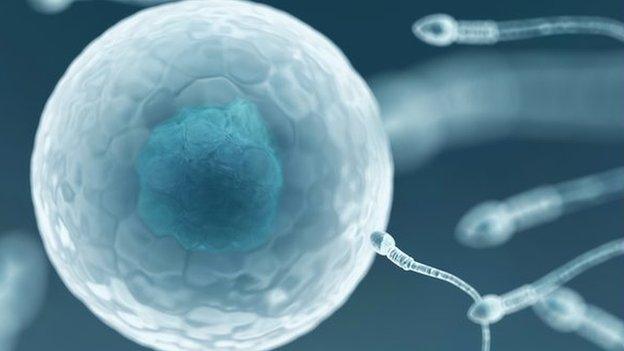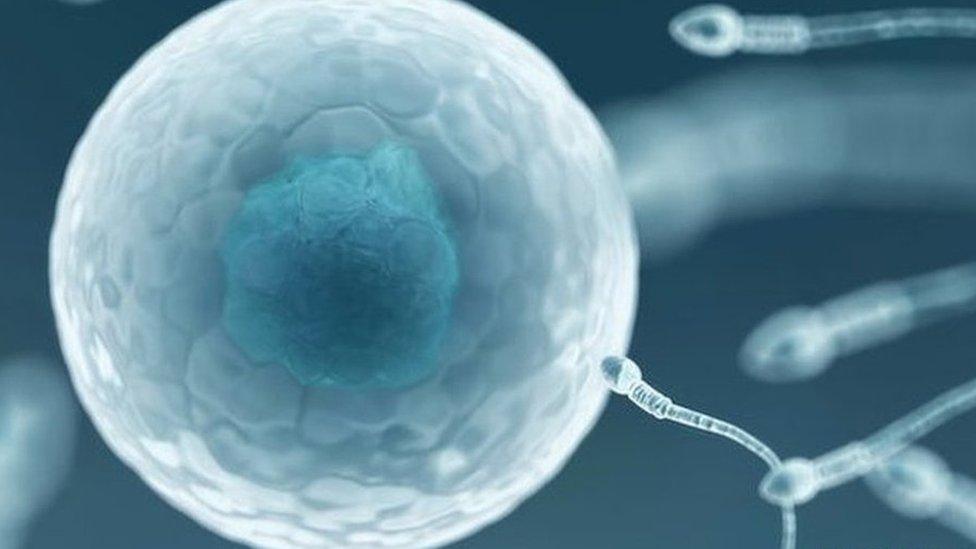I fathered 800 children, claims sperm donor
- Published
Simon Watson explains how he finds clients on Facebook
The number of women using donated sperm to get pregnant is rising, but many find the cost of treatment at private clinics prohibitive. This has led some women to use unlicensed donors - but are they putting their health at risk?
Simon Watson, 41, has been an unlicensed sperm donor for 16 years, donating once a week.
"Usually one [baby] a week pops out. I reckon I've got about 800 so far, so within four years I'd like to crack 1,000," he tells the Victoria Derbyshire programme..
"I've got kids all the way from Spain to Taiwan, so many countries. I'd like to get the world record ever, make sure no-one's going to break it, get as many as possible."
Very few women are eligible for artificial insemination on the NHS as the criteria are very strict. Private licensed clinics cost between £500 and £1,000 for each cycle of treatment. Men are allowed to father no more than 10 children.
Mr Watson charges £50 for his services - the "magic potion pot" - and most of his clients find him on Facebook.
They ask him questions, such as whether he has any hereditary diseases, then they meet, often at a service station on the M1. Clients either book a room in the hotel or use the public toilets.
He provides his own pot and syringe, and is tested for STDs every three months, posting his hospital certificate online. He claims a third of his donations work first time.
"If you go to a fertility clinic people have to go through lots of hurdles - counselling sessions, huge amounts of tests and then charge absolute fortunes for the service - but realistically if you've got a private donor you can just go and see them, meet them somewhere, get what you want and just go," he explains.
'Very disturbing'
But critics say while it's not illegal, using unregulated donors puts women at risk of sexual diseases, hereditary disorders and men interested in "no strings" unprotected sex.
Laura Witjens, chief executive of the National Gamete Donation Trust, says it does not often go wrong, but when it does, it goes "horrifically" wrong.
"There are too many occurrences where in other circumstances it would be called sexual harassment or rape."

Sperm donation: The rules at licensed clinics

The change in the rules in 2005 means children conceived using donor eggs or sperm will be able to trace their biological parent in the same way as children who are adopted
Those children will have no legal or financial claim against the donor parent
However, the law change was not retrospective so the first children concerned will not turn 18 until 2023. None of the rules has therefore been tested in any kind of court case
Donors do not have the right to trace their offspring

She says the language around donation is "lovey dovey" and focuses on people wanting to "help" and people celebrating successful pregnancies.
"But if you strip it down to bare facts, you have a man who for whatever reason feels they need to impregnate over 500 women, you have women who are comfortable knowing their children have 500 half siblings, in another setting people would be appalled. They would ask questions, find it very disturbing."

Laura Witjens says women should think more carefully before using unregulated donors
The HFEA says one in 10 IVF cycles used donated gametes or embryos in 2013 - the most recent year for which figures are available - and the number has grown.
In 2013, 49,636 women had a total of 64,600 cycles of IVF or Intra-cytoplasmic sperm injection (Icsi), of which 2,527 involved the use of donor sperm and 2,379 women had a total of 4,611 cycles of donor insemination.
Mr Watson, who has been married twice, has three children. It was after his first marriage ended that he started to donate.
"I thought I didn't want to go through all that again, I'd much rather go down to a sperm bank, have kids there, and if they ever come and see me later that's great, but if they don't, they don't," he says.
He admits his motivation could be linked to boosting his ego.
"I didn't get my first girlfriend until I was 18. I thought, 'I'm never going to get married and have kids.' A psychologist would say that's where it stemmed from, but I don't know, I've never been to one," he explains.
Siblings
The regulator, the Human Fertilisation and Embryology Authority (HFEA), limits the number of families created by a single donor father to 10.
It says social research into numbers of siblings shows someone could be comfortable with having that many half siblings.
Mr Watson's son Thomas helps him with his Facebook page. The 20-year-old says: "When a photo comes up it makes me happy and it's nice to know I have another brother or sister out there. All the time you get another random brother or sister pop up and you're like, 'Wicked.'"

The screening process
Potential donors - who must be aged between 18 and 40 - must be screened for any genetic abnormalities that could be passed on to offspring
Semen samples will be analysed for sperm quantity, quality and movement, and donors must also be checked for any infectious diseases, such as HIV
Those who pass these tests have their sample frozen for at least six months before it is tested again
Not all sperm cells survive freezing and thawing, which means that afterwards there may be a reduction in quality. Only men whose samples remain of acceptable quality after freezing can be donors

But Ms Witjens said the issue of child welfare was hard to ignore.
"Knowing you have 500 half siblings out there, when people have the need to find their family, we know that's very disturbing for these people. Women think about their cute little baby but forget they grow up into adults who do their own Facebook research."
All children born as the result of sperm donation since 2005 will have the right to know the identity of their father when they turn 18. However, a donor is not the legal parent and is not named on the birth certificate.
But with an unlicensed donor a woman can ask for child support at any time - and the man could claim paternity.
Ms Witjens says she appreciates that the cost of treatment can be expensive and some do not want to be in the clinical system.
"But if you can't afford £1,500 to secure safety for yourself and your child, you should wonder if you're fit for parenthood. It's an expensive job.
"What I find surprising is women investigate holiday destinations more than this."
The Victoria Derbyshire programme is broadcast on weekdays between 09:15 and 11:00 on BBC Two and the BBC News channel.
- Published1 September 2015

- Published1 September 2015
